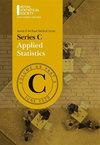在相关多重输入数据上进行变量选择的惩罚加权最小二乘估计
IF 1
4区 数学
Q3 STATISTICS & PROBABILITY
Journal of the Royal Statistical Society Series C-Applied Statistics
Pub Date : 2023-04-24
DOI:10.1093/jrsssc/qlad028
引用次数: 0
摘要
考虑到同一主题内不同数据集之间不可避免的相关性,提出了一种基于惩罚加权最小二乘(PWLS-MI)的多重输入数据变量选择框架。该方法的发展源于对中国浙江省A/H7N9患者进行的一项流行病学研究,在该研究中,近一半的变量没有得到充分观察。对于缺失数据的处理,通常采用多重插值法。但是,它在跨数据集的同一主题内的输入值之间生成相关性。最近关于多重输入数据的变量选择的工作并没有完全解决这种相似性。我们提出PWLS-MI在进行变量选择时将相关性纳入其中。可将PWLS-MI视为对多重输入数据进行变量选择的框架,因为它允许各种惩罚。我们以自适应LASSO为例进行了说明。我们进行了大量的模拟研究,将PWLS-MI与最近开发的方法进行了比较,结果表明,所提出的方法在选择准确性和删除准确性方面都优于其他方法。PWLS-MI应用于A/H7N9数据库时,可以选择具有临床相关性的变量。本文章由计算机程序翻译,如有差异,请以英文原文为准。
Penalized weighted least-squares estimate for variable selection on correlated multiply imputed data
Considering the inevitable correlation among different datasets within the same subject, we propose a framework of variable selection on multiply imputed data with penalized weighted least squares (PWLS–MI). The methodological development is motivated by an epidemiological study of A/H7N9 patients from Zhejiang province in China, where nearly half of the variables are not fully observed. Multiple imputation is commonly adopted as a missing data processing method. However, it generates correlations among imputed values within the same subject across datasets. Recent work on variable selection for multiply imputed data does not fully address such similarities. We propose PWLS–MI to incorporate the correlation when performing the variable selection. PWLS–MI can be considered as a framework for variable selection on multiply imputed data since it allows various penalties. We use adaptive LASSO as an illustrating example. Extensive simulation studies are conducted to compare PWLS–MI with recently developed methods and the results suggest that the proposed approach outperforms in terms of both selection accuracy and deletion accuracy. PWLS–MI is shown to select variables with clinical relevance when applied to the A/H7N9 database.
求助全文
通过发布文献求助,成功后即可免费获取论文全文。
去求助
来源期刊
CiteScore
2.50
自引率
0.00%
发文量
76
审稿时长
>12 weeks
期刊介绍:
The Journal of the Royal Statistical Society, Series C (Applied Statistics) is a journal of international repute for statisticians both inside and outside the academic world. The journal is concerned with papers which deal with novel solutions to real life statistical problems by adapting or developing methodology, or by demonstrating the proper application of new or existing statistical methods to them. At their heart therefore the papers in the journal are motivated by examples and statistical data of all kinds. The subject-matter covers the whole range of inter-disciplinary fields, e.g. applications in agriculture, genetics, industry, medicine and the physical sciences, and papers on design issues (e.g. in relation to experiments, surveys or observational studies).
A deep understanding of statistical methodology is not necessary to appreciate the content. Although papers describing developments in statistical computing driven by practical examples are within its scope, the journal is not concerned with simply numerical illustrations or simulation studies. The emphasis of Series C is on case-studies of statistical analyses in practice.

 求助内容:
求助内容: 应助结果提醒方式:
应助结果提醒方式:


